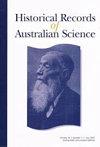David Roderick Curtis 1927–2017
IF 0.4
4区 哲学
Q4 HISTORY & PHILOSOPHY OF SCIENCE
引用次数: 0
摘要
大卫·柯蒂斯是识别中枢神经系统突触释放的兴奋性和抑制性递质的先驱。他在确定γ -氨基丁酸(GABA)和甘氨酸是抑制性突触释放的抑制性递质方面做出了重要贡献。他的工作为后来接受l -谷氨酸是主要兴奋性递质这一观点奠定了基础。大卫的科学工作使他获得了许多荣誉和荣誉,包括澳大利亚科学院院士、皇家学会院士和澳大利亚勋章。本文章由计算机程序翻译,如有差异,请以英文原文为准。
David Roderick Curtis 1927–2017
David Curtis was a pioneer in the identification of excitatory and inhibitory transmitters released at synapses in the central nervous system. He made major contributions to the identification of gamma-amino butyric acid (GABA) and glycine as inhibitory transmitters released at inhibitory synapses. His work laid the foundation for the subsequent acceptance that L-glutamate was the major excitatory transmitter. David’s scientific work led to him receiving many accolades and honours, including Fellowships of the Australian Academy of Sciences, the Royal Society and a Companion of the Order of Australia.
求助全文
通过发布文献求助,成功后即可免费获取论文全文。
去求助
来源期刊

Historical Records of Australian Science
HISTORY & PHILOSOPHY OF SCIENCE-
CiteScore
0.90
自引率
66.70%
发文量
22
期刊介绍:
Historical Records of Australian Science is a bi-annual journal that publishes two kinds of unsolicited manuscripts relating to the history of science, pure and applied, in Australia, New Zealand and the southwest Pacific.
Historical Articles–original scholarly pieces of peer-reviewed research
Historical Documents–either hitherto unpublished or obscurely published primary sources, along with a peer-reviewed scholarly introduction.
The first issue of the journal (under the title Records of the Australian Academy of Science), appeared in 1966, and the current name was adopted in 1980.
 求助内容:
求助内容: 应助结果提醒方式:
应助结果提醒方式:


